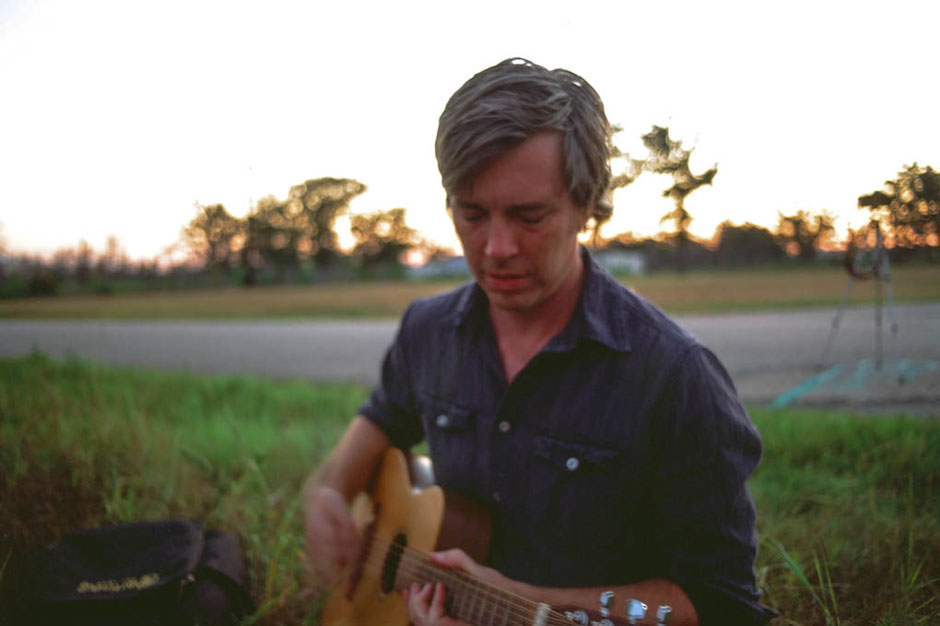Release Date: September 17, 2013
Label: Drag City
“I’ve got limitations,” Bill Callahan admits with characteristic matter-of-factness on the opening track to Dream River, his fourth studio effort under his own name. “Like Marvin Gaye,” he adds, guitar and fiddle quietly shimmering all around him. “Mortal joy / Is that way.”
For all the inherent modesty in the Austin singer-songwriter’s voice, most modest singer-songwriters wouldn’t kick off their albums by invoking the Trouble Man and Dirty Harry simultaneously. But Callahan puts it across with his usual deadpan bluntness, as if he’s just pointed out the most obvious thing in the world — and out of his mouth, it feels obvious. It’s a bold way to start an album, but the only way to start an album this bold.
Going back to his days as Smog (a moniker born in 1990 and retired in ’05), Callahan always has exuded a shamanistic beat-poet vibe, with a jazzman’s sense of time and a painterly way of sketching vivid scenes with just a few words and exquisitely…placed…pauses. The man doesn’t sing so much as induce trances, with a slow deliberation, as if he wants you to take notes and get every word down just so:
Drinking
While sleeping
Strangers
Unknowingly
Keep me company
In the hotel bar
Somehow, he manages to sound both measured and completely off-the-cuff at the same time, delivering his words in a baritone drawl that creates the feeling of bearing witness. It’s a shell-shocked voice you’d expect to hear from someone quietly describing a catastrophe he alone survived — or from a guy muttering to himself under his breath, trying to convince himself he’s remembering it right. It’s a voice that implies gravitas, even when Callahan is being playful. “Some people find the taste of pilgrim guts to be too strong,” goes one couplet. “Me, I find I can’t get by without them for too long.”
Callahan titled his last album as Smog A River Ain’t Too Much to Love; the image has stuck with him. Dream River seems to exist in a sepia-toned state of semi-consciousness, with other callbacks to earlier work. He called a 2009 album Sometimes I Wish We Were an Eagle; this time out, he rides an arrow “to meet the eagle in the sky” while the poor bird is “using the river as a map.” In contrast to the stark, just-folks twang of recent albums, though, low-key psychedelia prevails here. The album’s arrangements amble along in no particular rush — at about the pace of a steady rolling river, in fact — with judiciously placed squalls of guitar, pulsating keyboards, and prominent flute. One song, “Small Plane,” describes the mid-daydream feeling of flying without being in a hurry to return to earth, and that feeling prevails throughout. You can imagine finger-snapping folks in coffee houses digging it.
But don’t be snapping so loud that you miss Callahan’s vocals, which are still the main event. Despite his limited vocal range, he has a performance poet’s sense of how to bend words to play around with their sound and rhythm — like repeating a phrase over and over until it becomes a meaningless sound. On “Spring,” he delicately hammers at the word careless until it feels like one of Van Morrison’s fever-dream mantras, counterpointed by flute and menacing minor-key guitar flickering away on the periphery. “Spring looks bad lately anyway / Like death warmed over,” he observes, hinting at looming environmental disaster. But that doesn’t stop him from wanting to choose life anyway:
And all I want to do
Is to make love
To you
In the fertile dirt
With a careless mind
Careless careless careless mind
Dream River flows from one track to the next, with a similarity of tempo that makes it play like eight movements of one 40-minute song. But a few moments stand out, especially “Summer Painter,” in which Callahan’s rainy-day man gets blamed for a hurricane that hits right after he skips town (“Like all that time spent down by the water / Had somehow given me control over the rain”). Elsewhere, “The Sing” offers a master class in jarring similes by describing a silence as “high as scaffolding”; the closing “Winter Road” finds Callahan’s narrator traveling an icy road and trying to keep his wandering mind focused, a Donald Sutherland interview on the radio compelling him to think in filmic terms (“Looooong shot / Of my face”) and dwell on his loved ones.
And even though “The blinding lights / Of the kingdom / Can make you weep,” the wonder of it all still inspires him. “I have learned / When things are beautiful / To just keep on,” Callahan sings, trying to keep up with a guitar part that climbs higher and higher. And his voice actually…soars, if you can imagine such a thing.





